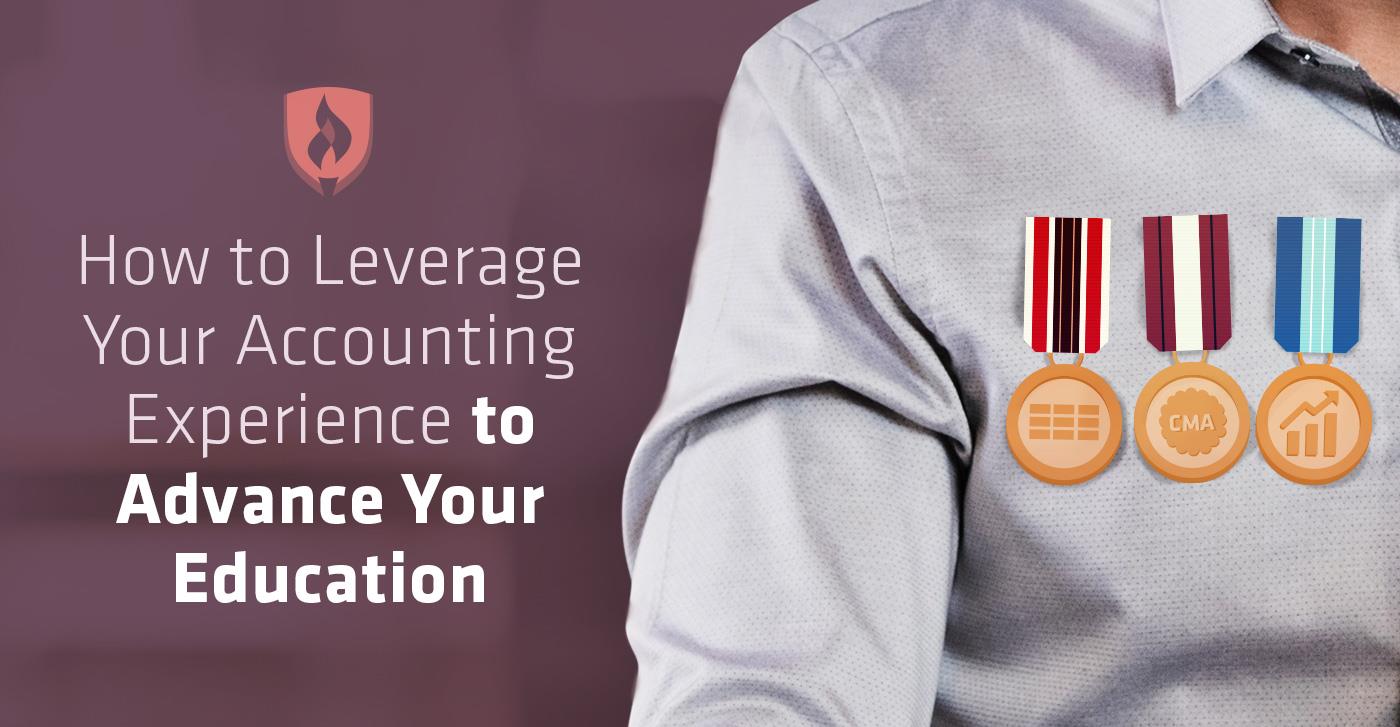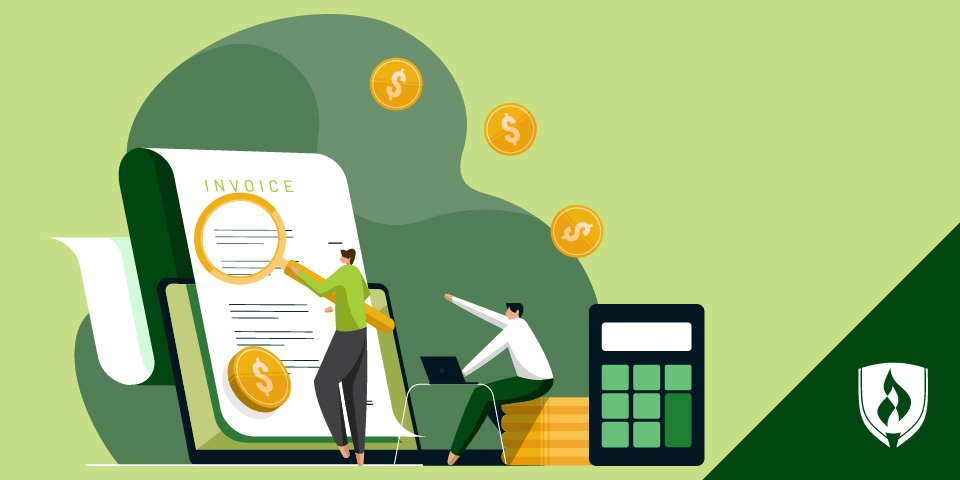How to Leverage Your Accounting Experience to Help Advance Your Education
By Ashley Abramson on 01/25/2017

Are you a busy business professional who is interested in taking the next step in your accounting career? Perhaps you are a bookkeeper or an administrative professional with accounting experience, and you want to take the next step to become a CMA or CPA.
You’re ready to climb the ladder in the accounting world, and you know you’ll need to advance your education to do so. Earning a bachelor's degree in accounting has the potential to open the doors to your future, but you’re busy and you can’t afford to waste time or money.
Don’t give up on your dream job in accounting just yet. The world of higher education is not the same one you remember from your high school days. Today there are several paths to earning your degree your way. There’s even one option that will allow you to capitalize on the accounting experience you’ve already acquired in the field.
Keep reading as we introduce you to an ideal option for current accounting professionals looking to advance their education.
A more practical way to learn
If saving time and money are major priorities in your life, a competency-based education (CBE) program in accounting may be your best option. Designed for busy, working individuals with families and other responsibilities in their lives, a CBE program will allow you to work toward your degree on your own time, at your own pace.
How does it work? Each program contains a list of courses that are made up of learning modules. Each module covers a specific skill or competency that graduates are expected to know. To complete the course, you must successfully complete each module.
But here’s where it differs from a traditional course. You’ll have the opportunity to show what you know, as soon as you know it. This means if you have knowledge or experience in a particular area, you can complete that module immediately. For topics you’re not as familiar with, you can spend more time learning the material.
Where traditional college courses typically require all students to work at the same pace, CBE programs allow you to work at your own speed. Since you’ll be building on the accounting knowledge you’ve already acquired from the workforce, you have the ability to shorten your timeline to graduation.*
Capitalize on your experience
The CBE program in accounting allows students to move through coursework at a faster pace because they’re able to demonstrate mastery right away, explains Carrie Daninhirsch, Vice President of Learning and Teaching at Rasmussen College.
“The individual who has worked in a family-run business and managed the accounts receivable for that company can move more quickly through some content areas because they are able to show what they know immediately,” Daninhirsch explains. This means you won’t have to sit through a semester-long course that covers the skills you already use on a daily basis.
Designed with adult learners in mind
Another benefit of the CBE program is the flexibility, which makes it both expedient and practical for busy professionals to earn a bachelor’s degree, according to Brooks Doherty, Assistant Vice President of Academic Innovation at Rasmussen College.
“[CBE] is conducive to the lives of adult learners — those who both bring world and workforce experience to the classroom and require flexibility to allow for the time constraints of family, work, and travel,” Doherty explains. “CBE prioritizes learning over fixed time commitments.”
You will essentially be in the driver’s seat of your accounting education if you choose to pursue a CBE program. You’ll work independently through your online learning modules, meeting deadlines that you decide on based on your own personal schedule. As soon as you feel you’ve mastered the material, you can “test out” and move onto the next area, getting one step closer to earning your bachelor’s degree in accounting.
Traditional courses would require you to sit through a predetermined number of hours while following an instructor’s set syllabus. But a CBE course will allow you to work independently at your own pace through your online learning modules, on deadlines you set based on your personal schedule.
Apply what you learn
The flexibility of a CBE program will allow you to continue working your current accounting job while you’re earning your degree. This means you can immediately apply the lessons you’re learning in your daily work, according to Doherty.
“CBE allows flexibility alongside rich faculty interaction and real-world application opportunities,” Doherty says. “With Rasmussen College’s authentic assessment approach to measuring learning within CBE programs, students have a clear picture of how their learning will find its place in the world.”
Though CBE programs are offered for a variety of majors, it is a particularly appealing option for students studying accounting, according to Kari Grittner, Accounting and Finance Chair at Rasmussen College.
“As accountants, we are used to working on our own, researching problems and then bringing solutions to the decision-making table,” Grittner explains. CBE courses allow you to follow this same process: researching problems, working on solutions and reporting those solutions in a professional format, such as an Excel spreadsheet, memo or business plan.
“This form of learning is designed to help the student make connections across different competencies as well as disciplines,” Grittner adds.
Practical knowledge for the real world
Just because the CBE format is flexible, doesn’t mean you’ll be missing out on a quality education. Doherty stresses that the Rasmussen College accounting program is designed to equip students in every program — CBE or not — to succeed in the real world of accounting.
“Students will not only learn key accounting skills, such as cost, revenue and financial statements, but they will also learn how to best think through problem solving and communicate results to their peers and bosses,” Doherty says.
After earning your bachelor’s degree in accounting, you will be amply prepared with the knowledge, skills and problem-solving abilities you’ll need to be successful in your new accounting career. And the icing on the cake? You will have saved time (and money) by leveraging the experience you already had!
Is CBE the solution you’ve been seeking?
If you’ve been waiting for a faster, more practical way to advance your education, this is it! Don’t waste time sitting in lectures learning about material you’ve already mastered in your accounting experience.
Check out our Interactive Guide to Competency-Based Education to learn more about how CBE can benefit your accounting career.
RELATED ARTICLES:
- 6 Benefits of Competency-Based Education that Will Excite Adult Learners
- The Number Cruncher’s Guide to Accounting Career Paths
- Is an Accounting Degree Worth It or Worthless?
*Completion time is dependent on transfer credits accepted and courses completed each term.
Advertisement: This article was created by Rasmussen College to promote its accounting programs. Please see www.rasmussen.edu/degrees for a list of the programs we offer. Rasmussen College is a regionally accredited private college and Public Benefit Corporation.




